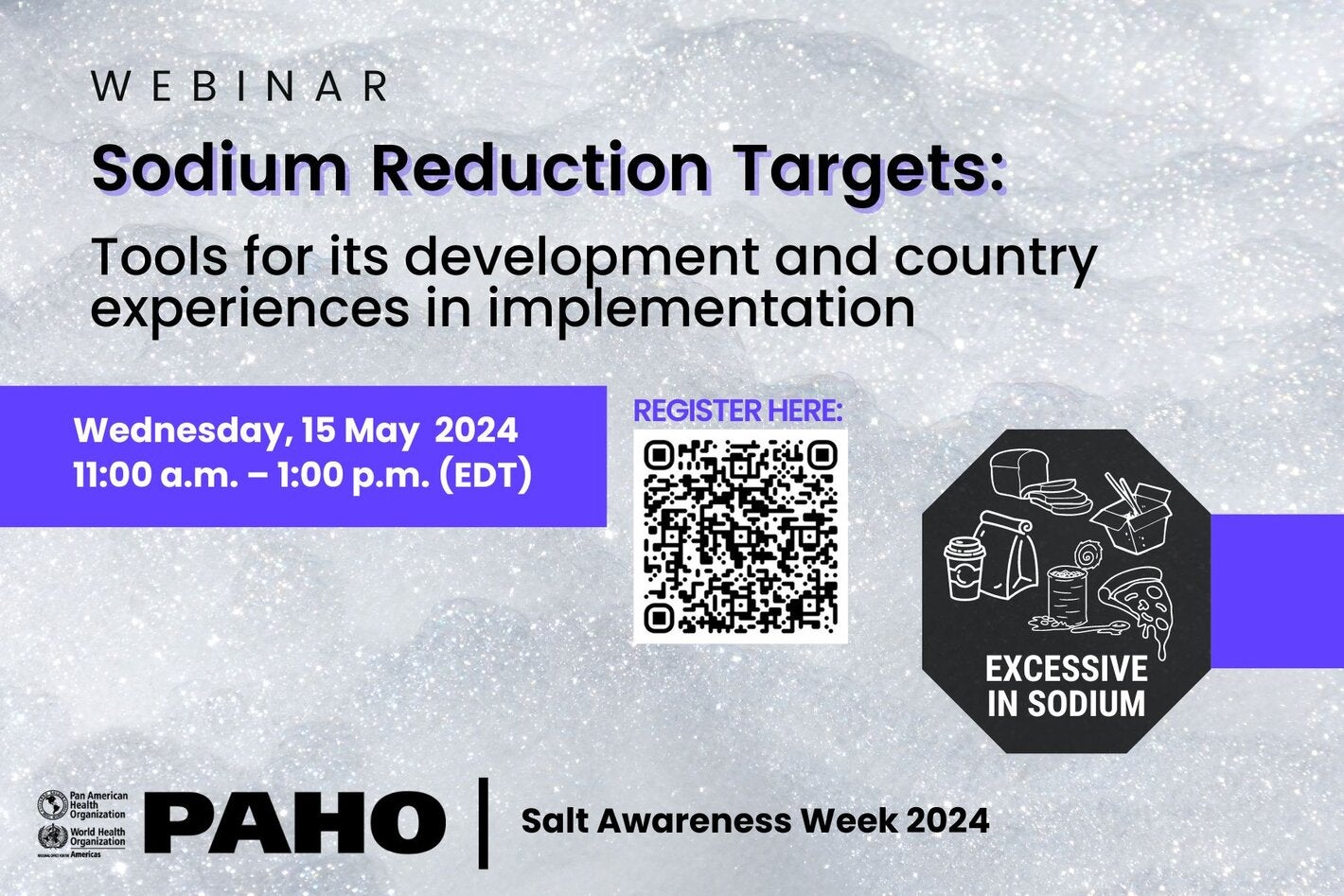
Join us on Wednesday, 15 May 2024, at 11:00 a.m. (Washington D.C. or EDT) for the webinar: Sodium Reduction Targets: Tools for Development and Country Experiences in Implementation. This webinar aims to present evidence on sodium intake from processed and ultra-processed foods in countries in the region of the Americas and experiences in countries that have implemented mandatory sodium reduction targets in packaged foods. Additionally, tools for the implementation of sodium targets will be presented.
Objectives:
- Present evidence on sodium intake from processed and ultra-processed foods.
- Share experiences from countries in the Region of the Americas on the implementation of mandatory sodium reduction targets.
- Provide tools for the implementation of sodium reduction targets.
How to participate
- DATE: Wednesday, 15 May 2024
- TIME: 11:00 A.M. to 1:00 P.M. (EDT) [check the local time in other cities at the end of this page]
- LANGUAGES: English and Spanish with simultaneous translation.
- REGISTRATION: https://paho-org.zoom.us/webinar/register/WN_mXfjZFPfSauvzn4uxoK9JQ#/registration
Context
The Pan American Health Organization (PAHO) supports Salt Awareness Week (13 to 19 May) by joining efforts with the international community and promoting policy actions to reduce salt intake in the Region of the Americas and protect public health.
Excessive salt consumption increases the risk of hypertension, the main cause of stroke and ischemic heart disease. Salt awareness week will focus on salt reduction to improve our health, and it will highlight that salt from all dietary sources contributes to excessive consumption, especially the hidden salt in processed and ultraprocessed food products.
In many countries, three-quarters of dietary sodium comes from processed and ultra-processed foods such as sauces and dressings, bread, crackers, cookies, ready-to-eat meals, processed meats, and cheeses. Reducing the sodium content in frequently consumed foods effectively reduces the population's sodium intake.
Salt reduction policies explicitly targeted at the food industry are necessary and relevant, and these must be implemented on a mandatory basis. PAHO/WHO has developed different tools to support Member States, including the new set of updated PAHO Regional Sodium Reduction Targets developed in collaboration with the University of Toronto and launched in October 2021. These targets include maximum thresholds for 75 subcategories, which fall under 16 food category headings. A 15% and 30% reduction were calculated for 2022 and 2025, respectively, from the measured levels of sodium at the 50º percentile. If the computed value for 2025 (30% reduction) was below the 25º percentile, the 25º percentile was used as the 2025 target.
Agenda
- 11:00 – 11:10 A.M.- Welcome and opening remarks.
- Vanessa García Larsen, PAHO/WHO
- 11:10 – 11:25 A.M. - Sodium intake in Colombina population.
- Gustavo Cediel, University of Antioquia
- 11:25 – 11:40 A.M. - Sodium intake in children younger than five years and school aged children in Uruguay.
- Florencia Köncke, Independent consultant
- 11:40 – 11:55A.M.- Regional PAHO Updated Sodium Reduction Targets. A tool to tackle the burden of diet-related noncommunicable diseases.
- Leo Nederveen, PAHO/WHO
- 11:55 A.M. – 12:15 P.M. - Sodium targets in Argentina. 10 years after its approval.
- Gabriela Flores, Ministry of Health, Argentina
- 12:15 – 12:35 P.M. - Development and implementation of sodium reduction targets in Colombia.
- Pamela Vallejo, Ministry of Health and Social Protection, Colombia
- 12:35 – 12:50 P.M. - Steps for sodium targets development and SHAKE technical guide review.
- Luz María de Regil, WHO
- 12:50 – 12:55 P.M. - Questions and answers.
- ModeraTor: Luis Galicia, OPS/OMS
- 12:55 – 1:00 P.M. - Closing remarks.
- Leo Nederveen, PAHO/WHO
Time in other cities
- 8:00 a.m. – Los Angeles, Vancouver.
- 9:00 a.m. - Belmopan, Guatemala City, Managua, Mexico City, San Jose (CR), San Salvador, Tegucigalpa,
- 10:00 a.m. – Bogota, Kingston, Lima, Panama City, Quito
- 11:00 a.m. – Asunción, Bridgetown, Caracas, Georgetown, Havana, La Paz, Port of Spain, Port-au-Prince, Nassau, Ottawa, Santiago, San Juan, Santo Domingo, Washington D.C.
- 12: 00 a.m. - Buenos Aires, Brasilia, Montevideo, Paramaribo.
- 5:00 p.m. – Geneva, Madrid
For other cities, check the local time using the following link.
Related links
Salt Awareness Week (13- 19 May, 2024)
Publications:




